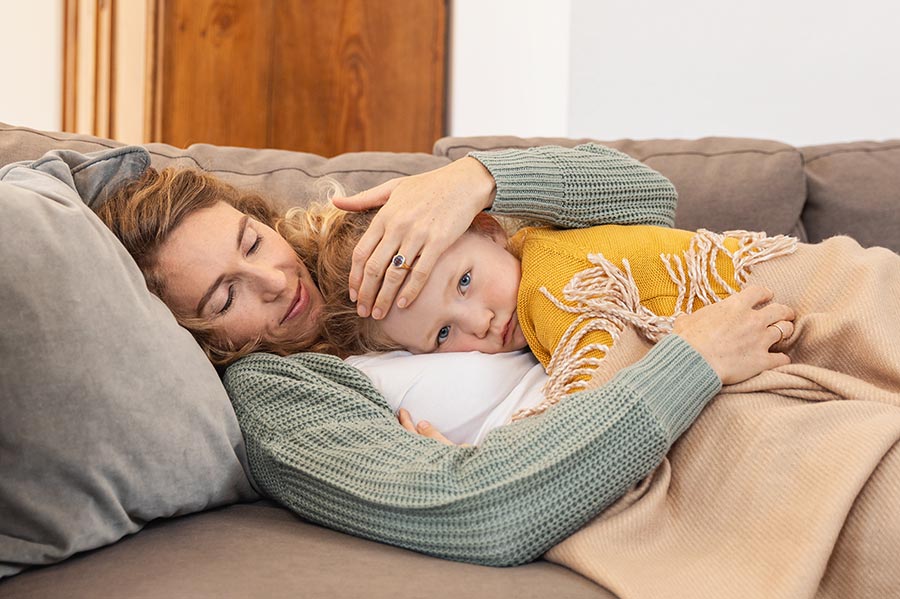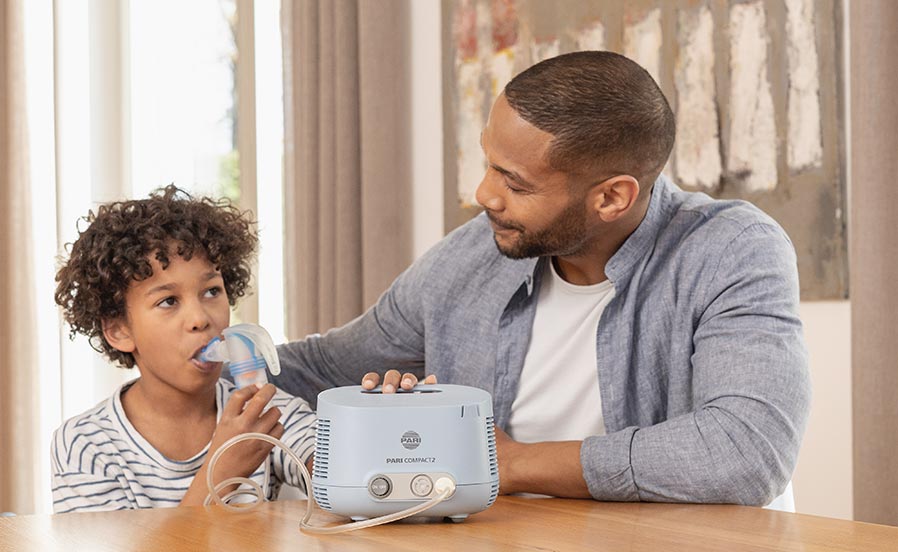The RSV virus can be harmless, like a cold with a sniffly nose, cough and sore throat; however, especially in young children up to the age of two years, it can cause serious respiratory diseases such as bronchiolitis. The infection figures reach a peak between November and February. Find out how you can protect your children and how the symptoms of an RS virus infection can be treated.

If you are infected with RSV, you will notice the first symptoms after two to eight days. You can infect others after only one day of catching the virus. The virus first makes itself felt in the upper airways with a sniffly nose, a dry cough and a sore throat. Within one to three days, the lungs may also be affected and may develop into obstructive bronchitis or bronchiolitis over the course of the illness. People in any age group can catch RSV several times, whereby subsequent infections tend to be much milder. Infants and young children are often more severely affected than adults.
Infections with the RS virus are the most common cause of hospital admissions due to lung disease in infants and young children. However, the infection is no cause to panic because it is harmless in most cases. 1% of infected young children have to be treated in hospital. Fewer than 0.1% are so ill that they need intensive medical care. Added to that, almost all children will have had the infection by the age of 2.
You should speak to your paediatrician about prophylactic measures if your child has the following risk factors:
It is almost impossible to avoid an infection in day-to-day life. Regular handwashing and, if you have symptoms, keeping a distance to other people can, however, reduce the spread. Unwell children should ideally stay at home. That helps them recover better and they will not infect as many other people.
As a matter of fact, in July 2023 the European Medicines Agency (EMA) issued a recommendation for the approval of a vaccine to immunise newborn infants. The vaccine is given to pregnant women. This gives newborn infants passive immunity which protects them from severe disease for six months. Please check with your doctor if the vaccine is already recommended in your country.
The parents of children with the aforementioned risk factors should therefore talk to their paediatrician about passive immunisation (prophylactic administration of antibodies) against the disease.
In adults, the main risk factor for a serious course of the disease is old age and underlying conditions. Unlike flu, the risk posed by RSV in the elderly has for many years been widely underestimated.
In April 2023, the EMA recommended the authorisation of a vaccine for people over the age of 60. The EU Commission followed this recommendation in June 2023. Patients are advised to consult their doctor on this subject.
In most cases, the innate immune system will successfully fight off the RSV and the infection will resolve within a few days or a week. If the disease spreads to the lungs, there may be complications such as bronchiolitis or obstructive bronchitis.
If an infant has a lung infection with the RS virus several times, or has complications such as acute bronchiolitis (inflammation of the bronchioles) or bronchitis (inflammation of the bronchi), the child may develop early childhood asthma as a long-term effect.
That shows how important it is to treat the symptoms of an RSV infection. Inhaling saline solution with a suitable inhalation device is a tried-and-tested method for many different types of respiratory disease. It is also used in practice to treat RS virus infections.

A causal/direct treatment for RSV is not possible. All that remains is to treat the symptoms and, ideally to do so without systemic side effects. Of course, more serious courses of the disease with complications must always be treated in consultation with the doctor, and sometimes require hospitalisation.
Inhalation therapy with saline solution is a tried-and-tested and completely natural treatment option used in practice in the treatment of RSV. If your child has a build-up of mucus, it is best that they inhale with hypertonic saline solution (salt content > 0.9% NaCl, e.g. 3%) to loosen the mucus. If he or she has a distressing, dry cough, an isotonic saline solution (= 0.9% NaCl) can help.
Lung specialists in the group Lungenärzte im Netz (lung specialists online) have found that: The inhalation of isotonic saline solution is suitable, irrespective of the type of pathogen2. This even applies before an infection, i.e. preventatively3.
Prof. Markus Rose from the Olga Hospital in Stuttgart points out in an interview with PARI that inhalation of hypertonic or isotonic saline solution is a sensible treatment option. His experience has show him that “inhaling saline solution is a treatment with a well-earned foothold in paediatric and adolescent medicine.”

Prof. Dr med. Markus Rose; Medical Director for Paediatric Pulmonology, Allergology and CF, Stuttgart Hospital
An infection with the RS virus is no cause for panic, but it should not be taken lightly in newborn infants and the elderly. Premature babies and people with a weakened immune system are particularly at risk. As parents of a premature baby or child with a heart defect, it is best your talk to your paediatrician about RSV prophylaxis. There is no causal, antiviral treatment for RSV. Inhaling saline solution is a tried-and-tested treatment method for treating symptoms of RSV.
Related topics and additional links:
For the parents of preterm babies and medical professionals: The S2k guideline „Leitlinie zur Prophylaxe von schweren Erkrankungen durch Respiratory Syncytial Virus (RSV) bei Risikokindern“ [Guideline for the prophylaxis of serious illnesses caused by respiratory syncytial virus (RSV) in at-risk children] was adapted in 2023 to comply with the current status of the German health system
References
[1] https://www.rki.de/DE/Content/Infekt/EpidBull/Merkblaetter/Ratgeber_RSV.html
[2] https://www.lungenaerzte-im-netz.de/news-archiv/meldung/article/einfaches-inhalieren-kann-troepfcheninfektion-effektiv-eindaemmern/
[3] https://www.lungenaerzte-im-netz.de/news-archiv/meldung/article/einfaches-inhalieren-kann-die-ansteckungsgefahr-mit-coronaviren-deutlich-senken/
Contact us
Any questions? You can reach our service center at this number:
+49 8151 279-5220
© 2025 PARI GmbH Spezialisten für effektive Inhalation